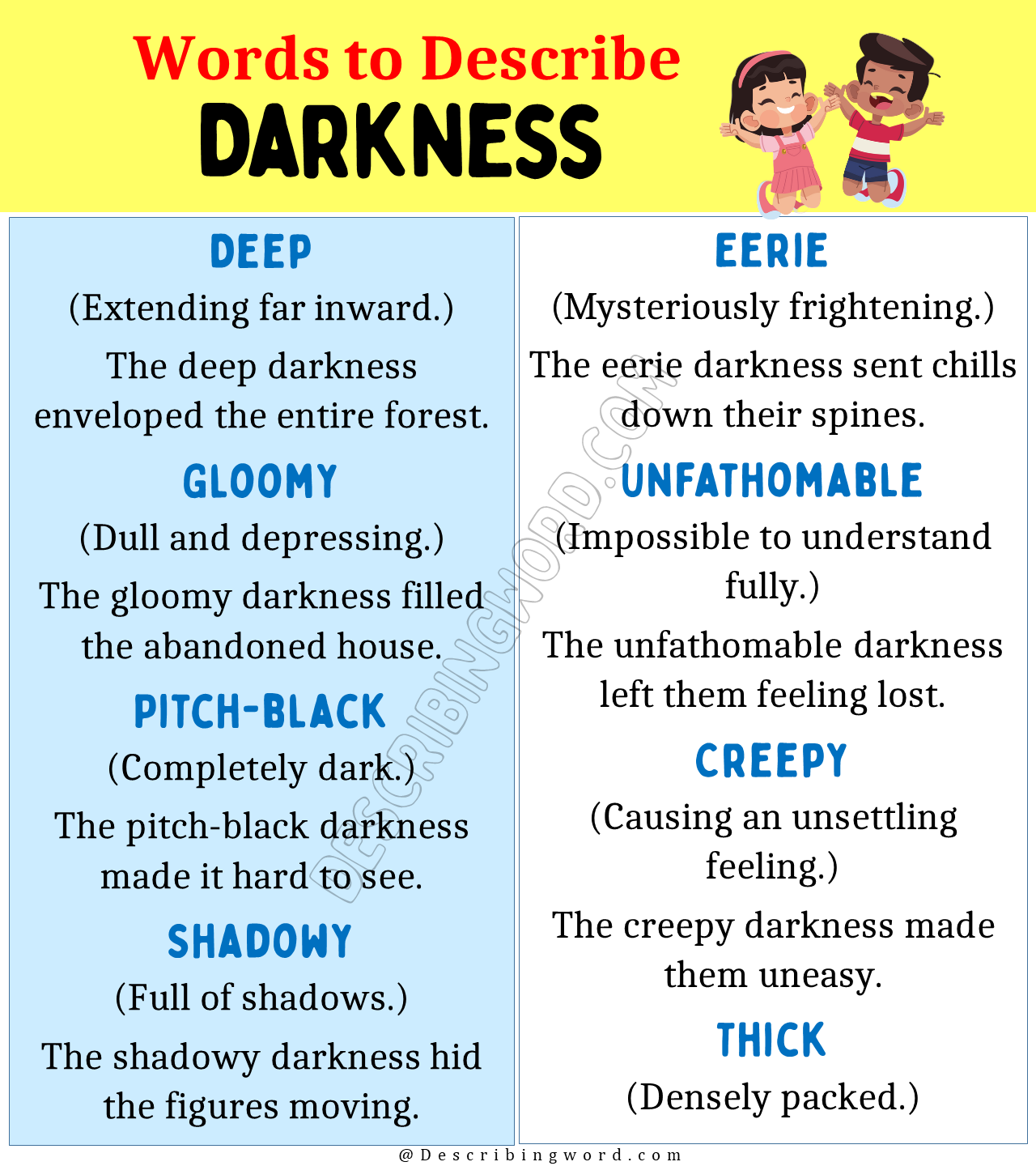Darkness is a multifaceted concept, invoking a range of emotions. Through adjectives, we can capture its varied shades, from the foreboding to the serene.
Words to Describe Darkness
Here are the most common words to describe Darkness:
- Pitch-black
- Gloom
- Shadowy
- Obscure
- Murky
- Dim
- Dusky
- Shaded
- Overcast
- Blackened
- Twilight
- Midnight
- Bleak
- Stygian
- Tenebrous
- Crepuscular
- Veiled
- Misty
- Opaque
- Cimmerian
- Darkling
- Deep-set
- Hazy
- Umbral
- Sable
- Night-time
- Faded
- Sunless
- Lurking
- Shrouded
Positive Words to Describe Darkness
- Serene
- Peaceful
- Tranquil
- Mystical
- Calm
- Restful
- Romantic
- Enigmatic
- Dreamy
- Soothing
Negative Words to Describe Darkness
- Foreboding
- Eerie
- Ominous
- Threatening
- Terrifying
- Sinister
- Frightening
- Menacing
- Haunting
- Chilling
Adjectives for Darkness
1. Deep
Meaning: Extending far inward.
Example: The deep darkness enveloped the entire forest.
2. Gloomy
Meaning: Dull and depressing.
Example: The gloomy darkness filled the abandoned house.
3. Pitch-black
Meaning: Completely dark.
Example: The pitch-black darkness made it hard to see.
4. Shadowy
Meaning: Full of shadows.
Example: The shadowy darkness hid the figures moving.
5. Eerie
Meaning: Mysteriously frightening.
Example: The eerie darkness sent chills down their spines.
6. Unfathomable
Meaning: Impossible to understand fully.
Example: The unfathomable darkness left them feeling lost.
7. Creepy
Meaning: Causing an unsettling feeling.
Example: The creepy darkness made them uneasy.
8. Thick
Meaning: Densely packed.
Example: The thick darkness blocked out all light.
9. Cold
Meaning: Lacking warmth.
Example: The cold darkness gave them chills.
10. Oppressive
Meaning: Causing discomfort or distress.
Example: The oppressive darkness seemed to weigh them down.
11. Quiet
Meaning: Making little noise.
Example: The quiet darkness was unsettlingly still.
12. Heavy
Meaning: Dense and difficult to move through.
Example: The heavy darkness felt like a physical barrier.
13. Total
Meaning: Complete and absolute.
Example: The total darkness engulfed everything around them.
14. Silent
Meaning: Absence of sound.
Example: The silent darkness heightened their fears.
15. Impenetrable
Meaning: Impossible to pass through.
Example: The impenetrable darkness blocked their view.
16. Sombre
Meaning: Serious and solemn.
Example: The sombre darkness felt like a mournful shroud.
17. Chilling
Meaning: Creating a feeling of cold fear.
Example: The chilling darkness made them shiver.
18. Foreboding
Meaning: Suggesting something bad is about to happen.
Example: The foreboding darkness hinted at danger ahead.
19. Stifling
Meaning: Restricting movement or breathing.
Example: The stifling darkness left them gasping for air.
20. Sinister
Meaning: Giving the impression of evil.
Example: The sinister darkness seemed to hide dangers.

Other Words to Describe Darkness
Words to Describe Heart of Darkness
- Deep-seated
- Profound
- Abyssal
- Intense
- Core
- Central
- Essential
- Fundamental
- Rooted
- Elemental
Words to Describe Light and Darkness
- Contrasting
- Polar
- Dichotomous
- Opposing
- Antithetical
- Juxtaposed
- Balanced
- Interplay
- Coexisting
- Dual
Beautiful Words to Describe Darkness
- Nocturnal
- Moonglow
- Starlit
- Silhouetted
- Nightfall
- Midnight-blue
- Eventide
- Moonbeam
- Twilighted
- Nightscape
How to Describe Darkness in Writing?
When describing darkness in writing, it’s essential to harness the senses and evoke an atmospheric response. Visual cues, although the most evident, are not the only means. The rustling of leaves, the distant call of an owl, or the cool touch of the night air all convey darkness in its full depth.
Texture and sensation can be vital tools. Describing the grainy feel of wet sand underfoot on a moonless beach or the eerie silence that blankets a city during a power outage adds layers to the scene. The thickness of the dark, where it feels almost palpable, can make readers feel enveloped.
Lastly, darkness often evokes emotional responses. The embrace of a comforting blackness that follows a heartbreak or the chilling void felt in an unfamiliar place enhances the reader’s connection. The key is not just to illustrate darkness but to make one feel it, breathing life into your narrative.
Explore Related Words:

